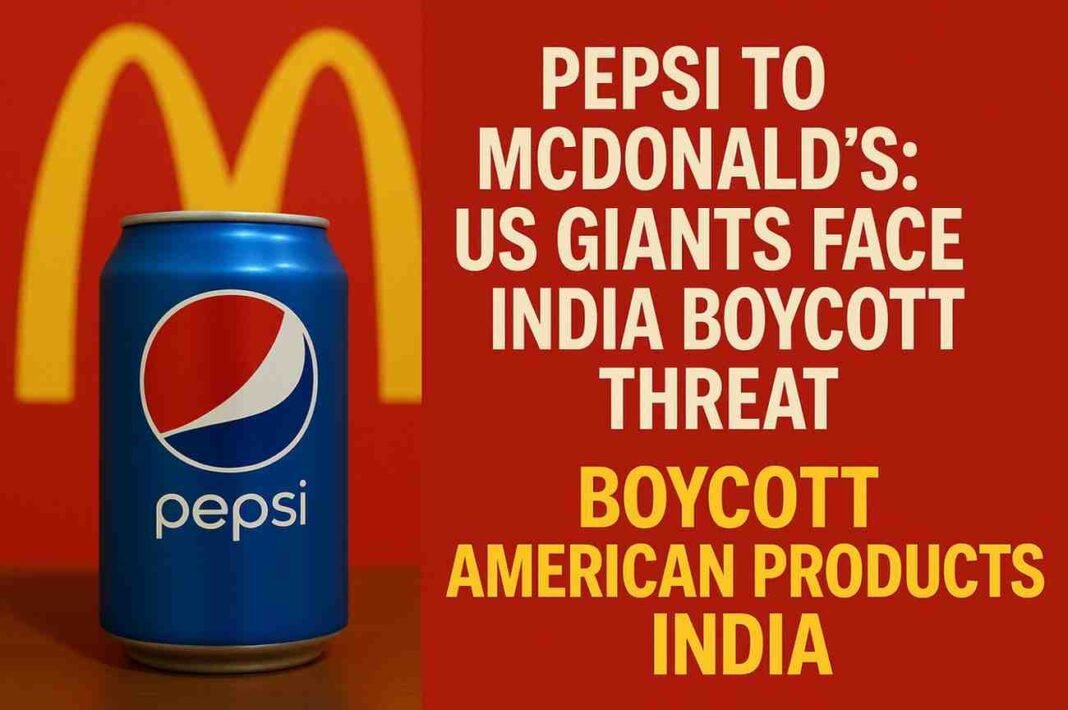Rising Tariffs Spark Tensions
The trade relationship between India and the United States has entered a turbulent phase after US President Donald Trump announced a steep 50 per cent tariff on Indian goods, citing New Delhi’s continued purchase of Russian oil. The tariffs, among the highest levied on any country, have triggered widespread anti-US sentiment across India. In retaliation, calls for boycotting American products and multinational corporations have gained momentum, echoing historic economic resistance movements.
Multinationals Under Pressure
Some of the largest US consumer brands operating in India—Pepsi, Coca-Cola, Subway, KFC, and McDonald’s—now face the risk of customer boycotts. With India’s population of 1.5 billion, even a partial consumer shift toward domestic products could result in significant losses for these companies. PepsiCo India, for example, reported revenues of ₹8,200 crore in fiscal year 2024 and ranks among PepsiCo’s top 15 global markets. The company has invested close to ₹3,500–4,000 crore in India in just the last three years.
Similarly, McDonald’s, operated by Westlife Foodworld Limited in West and South India, reported revenues of ₹2,390 crore in FY2024, a 5 per cent increase from the previous year. Both companies rely heavily on Indian consumers for steady growth, making them particularly vulnerable to public sentiment shifts.
𝐖𝐡𝐚𝐭 𝐢𝐟 146 crore Indians boycott American companies operating in India?
My open letter to @realDonaldTrump on US’s 50% tariffs for India, in which I 𝐮𝐫𝐠𝐞 him to “choose dialogue over discord, coordination over coercion.”
Jai Hind! pic.twitter.com/rQJXv8yhiY
— Ashok Kumar Mittal (@DrAshokKMittal) August 7, 2025
Ramdev’s Call for Boycott
Yoga guru and entrepreneur Baba Ramdev has amplified the boycott movement, urging Indians to completely avoid American products and outlets. “Not a single Indian should be seen at the counters of Pepsi, Coca-Cola, Subway, KFC, or McDonald’s. There should be such a massive boycott that it sends shockwaves across America,” he declared. His remarks have gained traction among nationalists and swadeshi advocates, with many linking the boycott to India’s larger push for economic self-reliance.
Modi Pushes ‘Vocal for Local’
Prime Minister Narendra Modi echoed similar sentiments, stressing the need for Indians to embrace “swadeshi” goods. He urged citizens to purchase only those products “made by the sweat of the people of India.” Modi reiterated his ‘Vocal for Local’ mantra, suggesting that such an approach was essential for India’s ambition to become the world’s third-largest economy. Without directly naming Trump, he remarked that global politics is increasingly driven by “economic selfishness,” with countries prioritizing their own interests above international cooperation.
US Justification and India’s Pushback
Trump defended his tariff decision on Truth Social, alleging that India was exploiting global markets by buying discounted Russian oil and reselling it for profit. He accused New Delhi of ignoring the humanitarian toll of the war in Ukraine, stating, “Because of this, I will be substantially raising the tariff paid by India to the USA.” On August 6, he imposed an additional penalty of 25 per cent, raising total tariffs to 50 per cent.
India responded firmly, calling the move “unfair, unjustified, and unreasonable.” Officials in New Delhi have pledged to take “all actions necessary to protect national interests,” though details of countermeasures are yet to be disclosed. The increased tariffs officially came into effect on August 27.
Echoes of History
The boycott call has drawn parallels with India’s Swadeshi Movement of 1905, which sought to reduce dependence on foreign goods as part of the freedom struggle. AAP MP Ashok Kumar Mittal referenced this history in an open letter to Trump, warning that a unified boycott by India’s 146 crore citizens would have a devastating economic impact on US businesses.
Global Ripples
The anti-American boycott trend is not unique to India. Protests against US policies and goods have already emerged in parts of France, the United Kingdom, and Canada. However, India’s scale presents a uniquely significant challenge. With its vast consumer base, the country represents one of the most lucrative markets for global corporations. A mass boycott could not only dent revenues but also force multinational brands to reassess their strategies in the region.
What Lies Ahead
For now, the future of US-India trade ties hangs in the balance. If the boycott movement gains momentum, multinational companies may face mounting pressure to localize supply chains, reduce reliance on imports, or even partner more deeply with Indian businesses. At the same time, Indian companies producing beverages, food products, and retail alternatives stand to gain from the swadeshi sentiment.
As tensions escalate, both governments may be forced to negotiate a middle path to prevent long-term damage to bilateral trade. Until then, American brands in India remain in the eye of the storm—caught between tariffs abroad and nationalist fervor at home.








